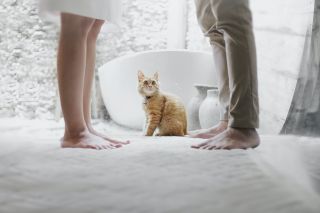Trauma
Does Your Pet Grieve the Way You Do?
Animals likely experience loss and grief.
Posted November 27, 2023 Reviewed by Kaja Perina
Key points
- The loss of a pet affects both humans and animals in the rest of the family.
- Animals often react similarly to humans following unexpected loss of a loved one and/or tribe member.
- Glutocorticoids are stress hormones that are elevated after traumatic events in both humans and animals.
Last week my family had to say goodbye to one of our two cats. He was strong, brave, and spent ten years seemingly speaking for both himself and his sister.
His sister was the runt of the litter, and I was told outside of earshot of my two young children and extremely hesitant husband, that these two kittens could only be adopted as a pair. And I can’t help but wonder what will happen to her now that he is gone.
Does the cat who remains in my home grieve for her brother?
According to many years of science: the answer is yes.
Jane Goodall described the way chimpanzees would show embarrassment1. No, their face would not turn red, nor would their words would not become an awkward stutter. Rather, they would try to cover up an action or event that had not worked out in the intended manner.
When one young chimp fell in front of his peers, Goodall saw him look over at one of his older peers to see if his error had been spotted. In what appeared to be an expression of relief that his faux pas had gone unnoticed. The young fellow then continued on with his casual play and grooming.
Similarly, primatologist Lisa Rappaport recalls watching the mother of a 7-month-old monkey demonstrate to the offspring how to find, or perhaps hunt, a small insect from within the branches of a tree, and the interaction between the two in which both mother and child appear proud. They were proud that learning had taken place.

Do animals grieve in the same way humans do?
The answer is a resounding, earth-shattering scream from the mouths of so many animal researchers all at once.
Hear the cry of Jane Goodall’s Tanzanian chimpanzee, Flint, who stopped eating and grew weak after his mother’s death.
Or the tears of the mother grieving her dead calf, a story told by Zoe Muller of the Rothschild’s Giraffe Project.
The number of first, second, and third-hand accounts that tell tales of animals grieving loved ones – both those animals born of them, and those companions bred with them by circumstances – are too many to count.
But, does this prove that animals can experience grief as do humans?
If anecdotal stores aren’t sufficient evidence to sway your point of view, scientists have discovered that the changes in hormone levels in animals after a loss or tragedy may be a physical indication of grief. This same fluctuation in hormones is also measurable in humans who survive natural disasters or traumatic, life-threatening events as well. A group of stress hormones called glucocorticoids are elevated after a traumatic and/or negative emotional event, and will continue to have a negative effect sometimes for up to a month after significant loss.
In certain mammals, such as baboons, there is a circular relationship between increased grooming, physical contact that stimulates release of the hormone oxytocin, and the inhibition of glucocorticoid release. This biological response acts as a subconscious, biological self-soothing method of sorts, where the baboons proximity to each other helps regulate their mood as individuals and as a group.
What does this all mean?
After the loss of a loved one, many animals increase physical contact. Physical contact releases oxytocin, which helps bond individuals to each other. When we feel bonded – as humans or animals – and therefore we feel part of a pack, our stress level goes down and we feel safer. If your animal experiences a loss, make sure you provide them with comfort in the form of physical contact, familiar toys and surrounding, and affectionate words.
References
1 Goodall J. 1990. Through a Window. Boston: Houghton-Mifflin.
2 Goodall J. 2000. Pride goeth before a fall. Pages 166–167 in Bekoff M, ed. The Smile of a Dolphin: Remarkable Accounts of Animal Emotions. New York: Random House/Discovery Books
Rapaport, L.G., Ruiz-Miranda, C.R. Tutoring in Wild Golden Lion Tamarins. International Journal of Primatology 23, 1063–1070 (2002).
3 Engh AL, Beehner JC, Bergman TJ, Whitten PL, Hoffmeier RR, Seyfarth RM, Cheney DL. Behavioural and hormonal responses to predation in female chacma baboons (Papio hamadryas ursinus). Proc Biol Sci. 2006 Mar 22;273(1587):707-12.
Cleary M, West S, Thapa DK, Westman M, Vesk K, Kornhaber R. Grieving the loss of a pet: A qualitative systematic review. Death Stud. 2022;46(9):2167-2178.


